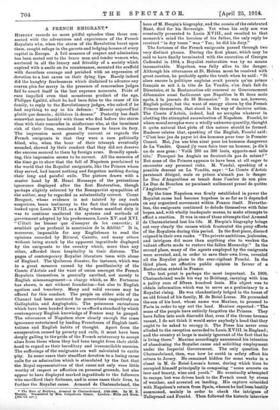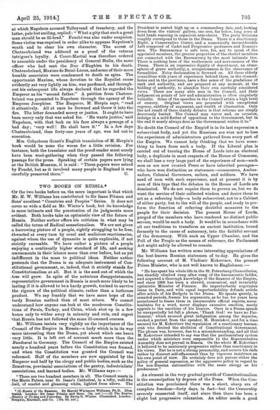A FRENCH EMIGRANT.•
• Tho Bete of Brittany, demand de CAatoantriand, 170-1809. By M. E. 'rrnnelated by Mr.. Colquhoun Grant. London: Mills and Boon, [rOe id. net.]
His records no more pitiful episodes than those con- nected with the adventures and experiences of the French Royalists who, when the storm of the Revolution burst upon them, sought refuge in the garrets and lodging-houses of every capital in Europe. A full measure of respect and admiration has been meted out to the brave men and tender women who, nurtured in all the luxury and frivolity of a society which expired with a smile on its countenance, mounted the scaffold with dauntless courage and perished with an expression of devotion to a lost cause on their dying lips. Rarely indeed did the haughty fearlessness which disdained to advance any craven plea for mercy in the presence of remorseless judges fail to assert itself in the last supreme moments. Pride of race impelled even that monstrous product of the age, Philippe Egalite, albeit he had been false to the cause of his family, to reply to the Revolutionary judges, who asked if he bad anything to say in his defence: " Mourir aujourd'hui • plutot que demain ; delibecez Id-deem:1s." Posterity has dealt somewhat more harshly- with those who fled before the storm than with their comrades in misfortune who, at the imminent risk of their lives, remained in France to brave its fury. The impression most generally current as regards the French emigrants is that they were a race politically blind, who, when the hour of their triumph eventually sounded, showed by their conduct that they did not deserve the success secured to them by foreign arms. Broadly speak- ing, this impression seems to be correct. All the memoirs of the time go to show that the fall of Napoleon proclaimed to the world that the Royalist emigrants, like the Princes whom they served, had learnt nothing and forgotten nothing during • their long and painful exile. The picture drawn with a master hand by M. Henri Houssaye of the pretentious ignorance displayed after the first Restoration, though perhaps slightly coloured by the Bonapartist sympathies of the author, may be regarded as substantially correct. Count Beng,not, whose evidence is not tainted by any such suspicions, bears testimony to the fact that the emigrants looked upon Louis XVIII. as a King whose manifest duty it was to continue unaltered the systems and methods of government adopted by his predecessors, Louis XV. and XVI. C'etait lea blesser que d'essayer de les convertir; it semblait qu'on profanht le sanctuaire de la fidelite." It is, moreover, impossible for any Englishman to read the opinions recorded by Rivarol, Cazotte, and many others without being struck by the apparent ingratitude displayed by the emigrants to the country which, more than any other, afforded them hospitality in their distress. The pages of contemporary Royalist literature teem with abuse of England. The Quiberon disaster, for instance, which was in a great measure caused by the pusillanimity of the Comte d'Artois and the want of union amongst the French .Royalists themselves, is generally ascribed, not merely to English mismanagement—a charge which, as Mr. Fortescue has shown, is not without foundation—but also to English -egotism and treachery. Many and valid excuses may be offered for this conduct. The people on either side of the Channel had been nurtured for generations respectively on Galloplrobia and Anglophobia. The poisonous caricatures which have been banded down to us afford a atandardby which contemporary English knowledge of France may be gauged. The utterances of Napoleon show clearly enough the crass ignorance entertained by leading Frenchmen of English insti- tutions and English habits of thought. Apart from the exasperation caused by poverty and exile, it must have been deeply galling to the pride of the French aristocracy to accept alms from those whom they had been taught from their child- hood to regard as their hereditary and irreconcilable enemies. The sufferings of the emigrants are well calculated to excite pity. In some cases their steadfast devotion to a losing cause calls for an admiration which is stimulated by the fact that the Royal representatives of that cause not only were little worthy of respect or affection on personal grounds, but also appear to have displayed marked ingratitude to the followers who sacrificed their fortunes, and in some cases their lives, to further the Royalist cause. Armand de Chateanbriand, the hero of M. Herpin's biography, and the cousin of the celebrated Rene, died for his Sovereign. Yet when his only son was eventually presented to Louis XVIII., and recalled to that monarch's mind the heroism of his father, the only reply he received "in dry tones" was "Yes; he did his duty."
The fortunes of the French emigrants passed through two very distinct phases. During the first phase, which may be said to have finally terminated with the execution of Georges Cadoudal in 1804, a Royalist restoration was by no means inconceivable. Napoleon was fully alive to the danger. Although his utterances at St. Helena must be received with great caution, he probably spoke the truth when he said : "Si alors encore la politique anglaise avait permis qu'un prince francais se alit it la thte de La Vendee, o'en etait fait da Directoire, et la. Restaunition efit renverse ce Gouvernement debonnaire aussi facilement que Napoleon he fit deux mois apres, h la journee. du 18 Brumaire." It was not, however, English policy, but the want of energy shown by the French Princes themselves, that stood in the way of decisive action. The Comte d'Artois, indeed, had no scruples whatever in abetting the attempted assassination of Napoleon. Fouche, to whom moral scruples were a wholly unknown quantity, thought it quite natural that plots of this nature should be formed. Renderer relates that, speaking of the English, Fouche said: " C'eat law jell de payer iei des hommes pour tuer le Premier ConsuL Moi, j'en use Bien ainsi pour lea hommes dangerenx de La Vendee. Quand j'y veux faire tuer nn homme, je dish
un de mes gene 200 on 300 louis, apporte-moi toile tete: Ponrquoi lea Anglaia ne feraient-ils pas de mama?" But none of the Princes appears to have been at all eager to encounter any personal risks. M. Vandal, speaking of a possible descent on La Vendee, says : " Le Comte d'Artoit paraissait design& male ce prince n'aimait pas le danger. Le Disc d'Angouleme se tenait dans l'ombre de son phre Le Duo de Bourbon ne paraissait nullenient Fosse de guide' l'Angleterre."
By the time Napoleon was firmly established in power the Royalist cause had become hopeless in so far as it depended on any organized movement within France itself. Neverthe- less, the emigrants continued to delude themselves with false hopes, and, with wholly inadequate means, to make attempts to effect a reaction. It was in one of these attempts that Armand de Chateaubriand lost his life. M. Herpin's biography brings out very clearly the causes which frustrated the puny efforts of the Royalists during this period. In the first place, discord reigned in their own ranks. " The private ambitions, jealousies, and intrigues did more than anything else to weaken the valiant efforts made to restore the fallen Monarchy." In the second place, many of the agents employed by the emigrants were arrested, and, in order to save their own lives, revealed all the Royalist plane to the ever-vigilant roach& In the third place, no effective public opinion in favour of a Restoration existed in France.
The last point is perhaps the most important. In 1809, Chateaubriand made his way to Brittany, carrying with him a paltry sum of fifteen hundred louis. His object was to obtain information which was to serve as a preliminary to a Royalist rising. He was clandestinely lodged in the house of an old friend of his family, M. de Boise.Lucas. He persuaded the son of his host, whose name was Maxime, to proceed to Paris in order to spy out the land. Maxima reported : "The mass of the people have entirely forgotten the Princes. They have fallen into such discredit that, even if the throne became vacant, I do not think it would enter anybody's head that they ought to be asked to occupy it. The Press has never even alluded to the reception accorded to Louis XVIIL in England; and the country at large is mainly ignorant of the fact that he is living there." Maxima accordingly announced his intention of abandoning the Royalist cause and soliciting employment under the Imperial Government. The only question for Chateaubriand, then, was how he could in safety effect his return to Jersey. He remained hidden for some weeks in a closet in M. de Boise-Lucas's house, during which time he occupied himself principally in composing " some sonnets on love and beauty, wine and youth." He eventually attempted to escape, but was driven back to the French coast by stress of weather, and arrested on landing. His capture coincided with Napoleon's return from Spain, whence he had been hastily summoned, mainly in order to check the intrigues of Talleyrand and Fouche. Then followed the historic interview
at which Napoleon accused Talleyrand of treachery, and the latter, pale but smiling, replied : "What a pity that such a great man should be so ill-bred." Fouche was also under suspicion. Some victim was required in order alike to appease Napoleon's wrath and to clear his own character. The arrest of Chateaubriand was adduced as a proof of the veteran intriguer's loyalty. A. Court-Martial was therefore ordered to assemble under the presidency of General Hnlin, the same officer who had sent the Duo d'Enghien to his death. Chateaubriand, Maxime de Boise-Lucas, and some of their more bumble associates were condemned to death as spies. The opportunist Maxime, whose devotion to the Royalist cause evidently sat very lightly on him, was pardoned, and through- out his subsequent life always declared that he regarded the Emperor as his "second father." A petition from Chateau- briand was presented to Napoleon through the agency of the Empress Josephine. The Emperor, M. Herpin says, "read it attentively. All at once he frowned and threw it into the fire. The letter demanded mercy or justice. It ought to have been mercy only that was asked for. He wants justice,' said Napoleon, with that look on his face always a presage of a bad day ; 'very well ! He shall have it.'" In a few days
• Chateaubriand, then forty-one years of age, was led out to execution.
Mrs. Colquhoun Grant's English translation of M. Herpin's book would be none the worse for a little revision. For instance, both the translator and the proof-reader must surely have been wool-gathering when they passed the following -passage for the press. Speaking of certain papers now lying at the British Museum, it is said : " These papers were seized by Fonche, but as it involved many people in England it was



























































 Previous page
Previous page